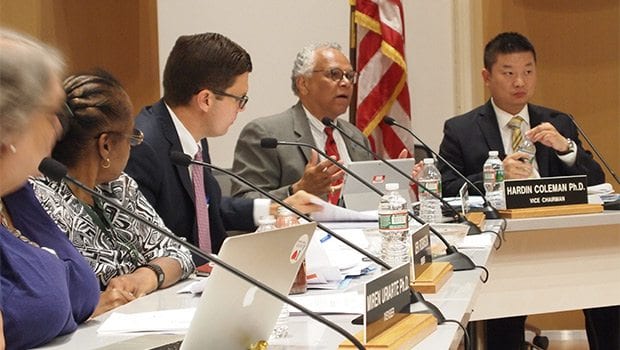Parents, councilors mull return to elected school committee
School start time debacle rekindles debate over best form of governance for schools

At the same time the Boston School Committee voted on Jan. 3 to elect member Michael Loconto president of the mayor-appointed body, a parent group took to Facebook and Twitter to gauge support for an alternative: an elected committee.

Members of the appointed school committee, Vice Chairman Hardin Coleman and former Chairman Michael O’Neill, listen to a presentation by BPS Superintendent Tommy Chang.
By Friday morning, Jan. 5, the Facebook poll showed support for an elected school committee winning out over support for the current appointed system 97 percent to 3 percent with 197 responses.
Roslindale parent Jane Miller said the idea for the poll came out of meetings held after the school department’s Dec. 6 announcement of new start times that had some elementary schools beginning as early as 7:15 a.m. In response to that controversial move, Miller created the Facebook group Start Smart BPS, where the school committee poll is posted.
“The idea of an elected school committee was brought up by a number of parents at meetings,” she said. “Some parents have been looking into this for a while.”
A quarter century
Boston has not had an elected school committee since the first seven-member appointed body was seated in 1992, after the state Legislature voted to approve the switch from a 13-member elected committee. In 1996, Boston voters decided by a 2-to-1 margin to keep the appointed board.
The elected body, which when dissolved included nine district seats and four at-large seats, had come under criticism for bringing politics to school administration. In the 1960s and ’70s, members of the then-all-white body fought efforts to share resources equally between communities, relegating students in the city’s black community into overcrowded schools. Per-pupil funding for black students was consistently lower than that for white students and blacks were routinely passed over for jobs in the school system. The School Committee was named as a defendant in the lawsuit that eventually brought court-ordered desegregation to the Boston schools.
In the post-busing years, the School Committee became more racially integrated, as did the schools. But the body was notorious for its rancorous meetings and sharp divisions. Arguments for abolishing the elected school committee centered around making the mayor solely accountable for the schools’ educational outcomes.
Since the mayor-appointed body was seated in 1992, its members have often voted unanimously, even on controversial issues, and the body has rarely taken a vote against the mayor’s policies or budgets.
In recent years, parent activists and elected officials have been urging Bostonians to reconsider the appointed board. Former District 7 City Councilor Tito Jackson pledged to bring back the elected school committee during his run for the mayor’s office last year. In October, the NAACP Boston Branch and Action for Boston Community Development held a forum on the return to an elected board.
A call for debate
NAACP President Tanisha Sullivan said the forum demonstrated that Bostonians want more discussion of the merits of an elected board.
“We’re an organization that has its roots in voter access and helping to ensure that all people have a voice through their votes,” she said. “Anytime you have a body like a school committee and people don’t have the power to vote, it’s something our organization has to look at.”
With three newly-seated Boston City Council members and growing pressure from parents, the council will look at the issue this year.
“It is something we should have more public conversation about and an item for discussion before the City Council’s Education Committee in this term,” said At-large Councilor Anissa Essaibi-George. “I look forward to that thoughtful conversation from all advocates for the various forms.”
District 7 Councilor Kim Janey said Bostonians should consider all options, including a hybrid appointed and elected body.
“One reason for having the appointed body is to make sure there’s a clear line of accountability to the mayor,” she said. “But a lot of parents feel there’s no accountability to them.”
Miller, who has three children at the Manning School in Jamaica Plain, said advocacy around the school start time issue gave parents who have not been involved previously in BPS issues a crash course in the workings of the system, including the appointed school committee.
“There are a lot more things going on than anyone ever realized,” she said. “The more parents I’ve spoken to, the more I’m finding out that a lot more parents feel that way.”







